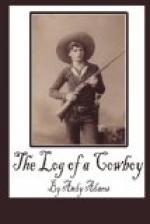The Indian Lakes, some seven in number, were natural reservoirs with rocky bottoms, and about a mile apart. We watered at ten o’clock the next day, and by night camped fifteen miles on our way. There was plenty of good grazing for the cattle and horses, and no trouble was experienced the first night. McCann had filled an extra twenty gallon keg for this trip. Water was too precious an article to be lavish with, so we shook the dust from our clothing and went unwashed. This was no serious deprivation, and no one could be critical of another, for we were all equally dusty and dirty.
The next morning by daybreak the cattle were thrown off the bed ground and started grazing before the sun could dry out what little moisture the grass had absorbed during the night. The heat of the past week had been very oppressive, and in order to avoid it as much as possible, we made late and early drives. Before the wagon passed the herd during the morning drive, what few canteens we had were filled with water for the men. The remuda was kept with the herd, and four changes of mounts were made during the day, in order not to exhaust any one horse. Several times for an hour or more, the herd was allowed to lie down and rest; but by the middle of the afternoon thirst made them impatient and restless, and the point men were compelled to ride steadily in the lead in order to hold the cattle to a walk. A number of times during the afternoon we attempted to graze them, but not until the twilight of evening was it possible.
After the fourth change of horses was made, Honeyman pushed on ahead with the saddle stock and overtook the wagon. Under Flood’s orders he was to tie up all the night horses, for if the cattle could be induced to graze, we would not bed them down before ten that night, and all hands would be required with the herd. McCann had instructions to make camp on the divide, which was known to be twenty-five miles from our camp of the night before, or forty miles from the Indian Lakes. As we expected, the cattle grazed willingly after nightfall, and with a fair moon, we allowed them to scatter freely while grazing forward. The beacon of McCann’s fire on the divide was in sight over an hour before the herd grazed up to camp, all hands remaining to bed the thirsty cattle. The herd was given triple the amount of space usually required for bedding, and even then for nearly an hour scarcely half of them lay down.
We were handling the cattle as humanely as possible under the circumstances. The guards for the night were doubled, six men on the first half and the same on the latter, Bob Blades being detailed to assist Honeyman in night-herding the saddle horses. If any of us got more than an hour’s sleep that night, he was lucky. Flood, McCann, and the horse wranglers did not even try to rest. To those of us who could find time to eat, our cook kept open house. Our foreman knew that a well-fed man can stand an incredible amount of hardship, and appreciated the fact that on the trail a good cook is a valuable asset. Our outfit therefore was cheerful to a man, and jokes and songs helped to while away the weary hours of the night.




